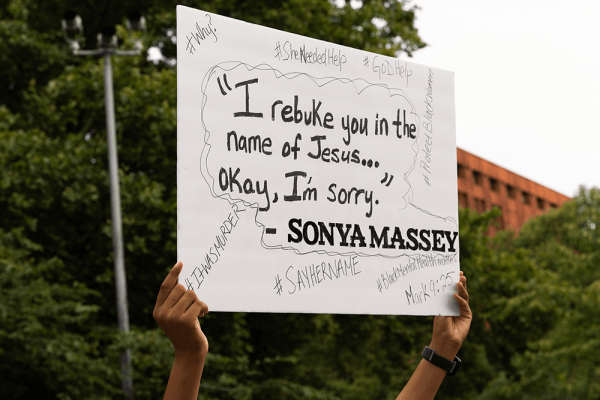How does a Black woman call for help and get killed by the people who came to support her?
I have asked myself this question repeatedly, ever since the video of Sonya Massey’s senseless killing was released last week. This 36-year-old Black woman dialed 911 to report a possible prowler, only to be shot by the police in her own kitchen — all over a boiling pot of water. As body cam footage has revealed, soon after the officers came inside, Deputy Sean Grayson asked Massey to check on a pot on the stove. When she went to the stove, presumably to follow his directive, things took a fatal turn. One of the deputies took a step back from what he refers to as, “your hot steaming water.” To that, she responded, “I rebuke you in the name of Jesus.” Her statement hauntingly anticipated the officer’s heinous impending actions.
Within the same week that I learned of the vicious killing of a Black woman by a county official of the U.S. government, Vice President Kamala Harris made history as the first Black and Asian woman to become the presumptive Democratic nominee for president — putting her 270 electoral votes away from becoming the most powerful official in the U.S. government, and possibly the world.
In some ways, I found myself navigating contrasting emotions as I mourned a terrible tragedy while marking a monumental milestone. Horror sat next to hope. But I also realized, whether you’re a Black woman in a kitchen in central Illinois or a Black woman at the center of one of the most consequential elections in American history, you’re not immune to misogynoir — the unique discrimination and oppression against people who live in the intersection of being Black and women.
The headlines over the past week had stark differences, startling implications, and reminders of truths that have remained consistent throughout the times and throughout the Christian faith:
Truth #1: The assault on Black lives is still urgent (and has been for 400+ years)
“The Lord works righteousness and justice for all who are oppressed” (Psalm 103:6).
The Black Lives Matter uprising of 2020 ignited passion like never before. People of all identities expressed public outrage about George Floyd’s horrifying murder. Countless people optimistically claimed that season marked a tipping point in the public’s commitment to racial justice efforts. But many Black people expressed skepticism; we had seen this before. Soon enough, the passion would subside, the urgency would diminish, and the backlash would arrive … and it did. Many more Black people have been killed by police since the uprising, including Daunte Wright, Ma’Khia Bryant, Roger Fortson, and numerous others. None of them have gotten the same level of attention or outrage.
While Harris’ presumptive nomination certainly demonstrates that change is possible, please don’t get the facts twisted: A Black and Asian woman’s ascendance into the highest office does not mean that we have defeated racism, and her individual elevation certainly does not effectively end systemic misogynoir. During Barack Obama’s presidency, many people incorrectly asserted that we were a “post-racial society” as a result of his election — yet we saw the rise of Black Lives Matter within his presidency due to the more publicized police killings of Black people in his last term. So, it is no contradiction that we learned of the murder of Massey in the same month we learned that Harris would be the presumptive Democratic nominee.
The urgency around Black safety and survival has remained consistently true. Sonya Massey’s death is the most recent; had her family not demanded accountability, I wonder if we would have ever heard her name. Racialized police violence didn’t go away after the 2020 protests fizzled out; it just got hidden, forgotten, or dismissed.
Truth #2: Justice pursuits always face opposition.
“Our desire is not that others might be relieved while you are hard pressed, but that there might be equality. At the present time your plenty will supply what they need, so that in turn their plenty will supply what you need. The goal is equality” (2 Corinthians 8:13-14).
Much of the backlash to the 2020 uprisings have been directed toward Diversity, Equity, and Inclusion efforts. Opponents of DEI practices claim that unqualified candidates take the jobs of more deserving and qualified white people. Even Congress members Harriet Hageman and Tim Burchett have called Harris’ campaign ascension a “DEI hire.” And many institutions have walked back their equity commitments. Some organizations have even deleted DEI language from their policies, along with entire DEI positions and departments.
As the CEO of an organization that teaches race equity, I know that this work has always been under attack. But DEI work does not aim to give jobs to unqualified people (in fact, Black women know all too well that we often must be overqualified for positions in order to be considered). In actuality, DEI work levels the playing field and widens the application pool by giving historically and presently overlooked candidates a chance to be considered. While these efforts to level the playing field will inevitably diversify institutions, the overall initiative works toward collective liberation by eliminating social disparities and creating inclusive environments that take care of all their people.
Truth #3: Black women need support in all areas of life.
“This is what the Lord Almighty said: ‘Administer true justice; show mercy and compassion to one another” (Zechariah 7:9).
In 1962, Malcom X stated that the most disrespected, unprotected, and neglected person in the U.S. is the Black woman. That poignant assertion continues to ring true today. These issues are not far away. It can be easy to criticize what is happening in the White House and in the criminal legal system — and, by effect, neglect its proximity and permeance in our lives. From our homes to our workplaces to our churches, from behind closed doors to public settings, I have heard Black women’s pleas for protection and support amid hardship and burden — and I have made them myself. I have felt the pangs of neglect and disregard when people treated me as if I was less-than. We have collectively pushed for respect and rightful consideration within institutions, and in this world; but we can’t do it alone. We need allies, and we need them within the church: the institution notoriously known as the most segregated place in America.
What will that mean for this season? What will this mean for your life? From the pulpit to Bible study groups and fellowship dinner tables, there are spaces in faith-based settings to condemn racism and misogynoir:
- Say Sonya Massey’s name and continue speaking up against police brutality that is so riddled with anti-Blackness.
- Address the misogynoir that is showing up in dialogue about Harris, and about Black women in your own spaces. Regardless of political views, there is no room for the vitriolic, degrading, and disrespectful racism and sexism that is being used to attack her candidacy, and her very existence. This disruption of misogynoir should extend beyond the political stage and into our lives.
- Promote DEI within your church because the work is just as urgent within those walls, as it is in education and workplaces. Churches should not only speak of justice in their sermons but must also commit to the internal equity work within their own institutions, through policies, employment, and culture.
Last week demonstrated that we can hold multiple truths at once, as demonstrated by Harris’ historic campaign in tandem with the video of Massey’s heinous murder. The timing is not coincidence, it is indicative: Progress is possible, but work is still needed. All around us, Black women are both asking people to trust our capabilities and calling for help in the struggle against injustice; yet we often receive criticism, negligence, and even death in response. Our requests for support should not come with repercussions, and our rightful pursuit of excellence and possibilities shouldn’t be attacked.
We can build a world where Black women are safe and supported — where our calls for help are not met with violence, where our accomplishments are not met with skepticism and misogynoir. When that becomes a reality, every person in the U.S. will benefit. For “if one part suffers, every part suffers with it; if one part is honored, every part rejoices with it” (1 Corinthians 12:26). That is the call for justice. That is the call of our faith.
Got something to say about what you're reading? We value your feedback!







